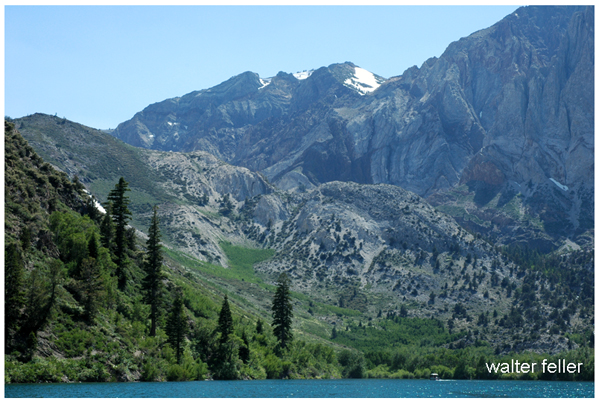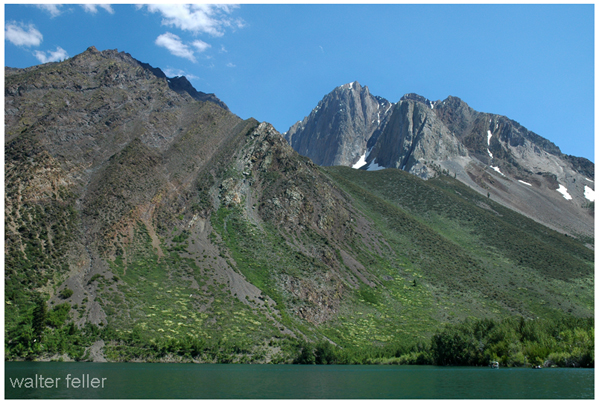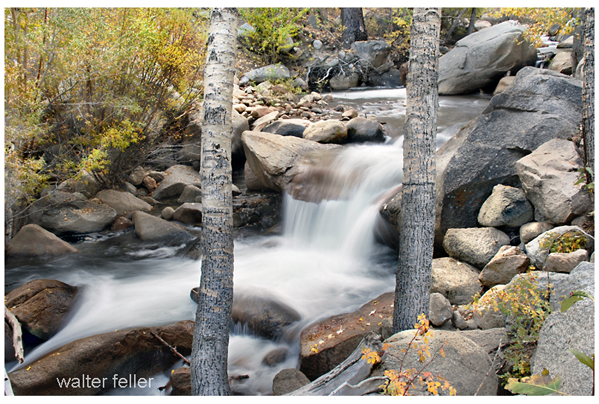from The Story of Inyo – W.A. Chalfant -1922
The most desperate prison break in the history of the West occurred at the Nevada penitentiary at Carson on the evening of Sunday, September 17, 1871. Twenty-nine convicts, murderers, train robbers, horse thieves and others of like ilk, gained temporary liberty after killing one man and wounding half a dozen more. The bravery of the handful of prison guards, the action of a life prisoner in opposing the escape and fighting the convicts, and other details make an interesting story, but one outside the field of this history. Inyo’s interest in the affair became direct when one of the gangs of desperadoes started with intent to recuperate in Owens and Fish Lake valleys, as a preliminary to raiding a store at Silver Peak and escaping with their loot to seek refuge among the renegades, Indians and whites, who had established themselves in the far deserts.

Billy Poor, a mail rider, was met by the convicts, who murdered him in cold blood, took his horse and clothing and dressed the corpse in discarded prison garb. When news of the occurrence reached Aurora, the boy’s home, a posse set out ill pursuit of the escapees. The trail was found at Adobe Meadows, in southern Mono, and word was sent to Deputy Sheriff George Hightower, at Benton. Hightower and ten others from Benton trailed the fugitives into Long Valley. Robert Morrison, who came to Owensville in 1863 and was at this time a Benton merchant, first sighted the men, in the evening of Friday, the 23d. The pursuers went to the McGee place, in southern Long Valley, and spent the night, and the following morning went up the stream then known as Monte Diablo Creek, but now called Convict.
As the posse neared the narrow at the eastern end of the deep cup in which Convict Lake is situated, a man was seen running down a hill a hundred yards ahead. The pursuers spurred up their horses and soon found themselves within forty feet of the convicts’ camp. Three convicts took shelter behind a large pine tree on the south side of the stream, and began firing. Two of the horses of the posse were killed and two others wounded, and one of the posse was shot through the hand. Morrison dismounted, began crawling down the hillside to get nearer, and was shot in the side. The rest of the posse fled. Black, convict, went after Morrison, passing him until Morrison snapped his gun without its being discharged; Black then shot him through the head.

The convicts went up the canyon to where an Indian known as Mono Jim was keeping some of the citizens’ horses. Thinking that the approaching men belonged to the posse, Jim announced that he had seen three men down the canyon. As he saw his mistake Black shot him. Jim returned the fire, wounding two of the horses the convicts had, and was then killed. Morrison’s body remained where it fell until Alney McGee went from the house in the valley that evening and recovered it. The convicts had left. Morrison’s body was taken to Benton and buried by the Masonic fraternity.
“Convict” was thenceforward adopted as the name of the beautiful lake and stream near the scene. A mighty peak that towers over the lake bears the name of Mount Morrison.
Word had been sent from Benton to Bishop, and a posse headed by John Crough and John Clarke left the latter place, after some delay due to failure of the messenger to deliver his letter.
The trail was picked up in Round Valley, which the convicts had crossed. The latter had made their way into Pine Creek Canyon, and were so hard pressed that they abandoned one of their horses and lost another over a precipice. News that the men w^ere located, and the fact that they were armed with Henry rifles, superior to the weapons of the citizens, was taken to Independence by I. P. Yaney. The military post was at that time commanded by Major Harry C. Egbert, who afterward became General Egbert and lost his life as a brave soldier in the Philippines. Major Egbert selected five men to accompany him in the hunt, and also provided a supply of arms for any citizens who might wish to use them for the main purpose. They made the trip to Bishop in seven hours, which was rapid traveling in those days.

Convicts Morton and Black were captured in the sand hills five miles southeast of Round Valley, on Wednesday night, ten days after their escape. They were taken by J. L. C. Sherwin, Hubbard, Armstead, McLeod and two Indians. A few shots were exchanged before the fugitives threw up their hands in token of surrender. An Indian mistook the motion and fired, the shot striking Black in the temple and passing through his head, but strangely not killing him. The two were taken to Birchim’s place in Round Valley. Black was able to talk, and laid the killing of Morrison on Roberts, a nineteen-year old boy. After hearing his story a posse resumed the hunt for Roberts in Pine Creek Canyon.
This posse was eating lunch in the canyon on Friday when they observed a movement in a clump of willows within twenty yards of them. The place was surrounded and Roberts was ordered to come out and surrender. He did so, saying that if they intended to kill him he was ready if he could have a cup of coffee. He had been five and one-half days without food. When he confronted Black at Birchim’s, the conduct of the older villain satisfied all that he and not Roberts had slain Morrison.
The three prisoners were placed in a spring wagon Sunday evening, October 1st, and with a guard of horsemen started from Round Valley for Carson. Near Pinchower’s store, where the northern road through West Bishop intersected the main drive of that vicinity, the escort and
wagon were surrounded by a large body of armed citizens. ”Who is the captain of this guard?” was asked. “I am; turn to the left and go on.” But the mob did not turn to the left nor was there any resistance. Morton, who sat with the driver, said: “Give me the reins and I’ll drive after them ; I’m a pretty good driver myself.” Roberts, who had been shot in the shoulder and in the foot in the encounter in Long Valley, was lying in the bottom of the wagon. He offered objections to going with the citizens, but without effect, and with Black driving to his own hanging, the wagon and its escort moved across the unfenced meadow to a vacant cabin about a mile northeasterly. On arrival there. Black and Roberts were carried into the house, both being wounded. Morton got down from the wagon with little assistance and went in with them.

Lights were procured, and all present except the guards over the prisoners formed a jury. The convicts were questioned for two hours before votes were taken, separately on each prisoner. It was decreed that Black and Morton should be hanged at once. The vote on Roberts was equally divided for and against execution, and his life was saved by that fact.
A scaffold was hastily set up at the end of the house, one end of its beam resting on the top of its low chimney, the other supported by a tripod of timbers. Morton hoard the preparations going on, and asked: “Black, are you ready to die?” “No, this is not the crowd that will hang us,” replied Black. “Yes, it is,” said Morton; don’t you hear them building the scaffold”?” Morton was asked if he wished to stand nearer the fire which had been made to modify the chill of- the late autumn night. “No, it isn’t worth while warming now,” he answered; and turning to Roberts he said: “We are to swing, and I mean to have you swing with us if we can ; we want company. ” Black was carried out and lifted into a wagon which had been driven under the scaffold; after being raised to his feet he stood unsupported. Morton walked out and looked over the arrangements calmly, climbed into the wagon, and placed the noose over his own head. He asked that his hands be made fast so that he could not jump up and catch the rope. Black asked for water ; Morton asked him what he wanted with water then. When asked if they had anything to say, Black said no. Morton said that it wasn’t well for a man to be taken off without some religious ceremony, and if there was a minister present he would like to have a prayer. Whether it seems strange or otherwise, there was a minister present by request. He spoke a few words, after which Morton said: “I am prepared to meet my God—but I don’t know that there is any God.” He shook hands with the men on the wagon, and then the minister prayed. Only his voice and a sigh from Black broke the stillness. As “Amen” was pronounced the wagon moved away. Black was a large and heavy man and died without a struggle. Morton, a very small man, sprang into the air as the wagon started, and did not move a muscle after his weight rested on the rope.
Young Roberts was taken to the county jail at Independence, and after partial recovery from his wounds was returned to the Carson prison. Others among the escapes were believed to have come this way, and hard search was made for them through the mountains. That one named Charley Jones had come to Bishop Creek and had probably received some assistance was a general belief, but what became of him was never known unless to a select circle. Four of the escapes were captured on Walker River while they were feasting on baked coyote. Eighteen of the twentynine were captured or killed within two months of the prison break.
— end —
Also see:
Convict Lake
Convict Lake (elevation 7,850 feet (2,393 m)), is a lake in the Sherwin Range of the Sierra Nevada. It is known for…